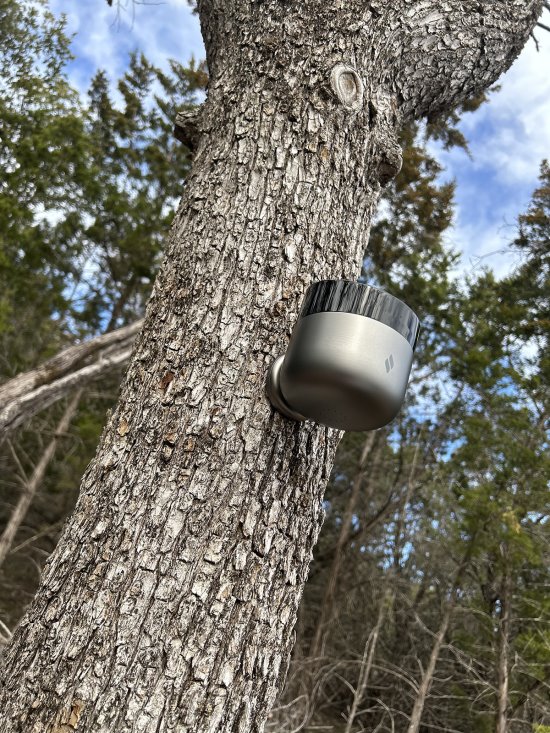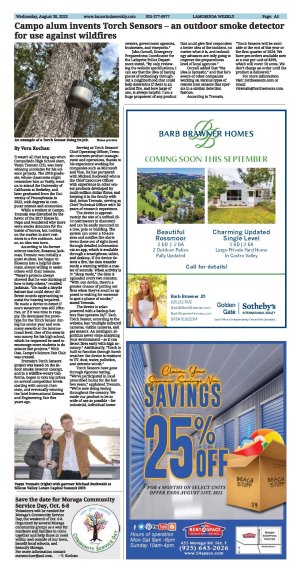| | Published August 30th, 2023
| Campo alum invents Torch Sensors - an outdoor smoke detector for use against wildfires
| | | By Vera Kochan |  | | An example of a Torch Sensor doing its job. Photos provided |
It wasn't all that long ago when Campolindo High School alum, Vasya Tremsin (23), was busy winning accolades for his science projects. The 2018 graduate, whose classmates might remember him as Vasily, went on to attend the University of California at Berkeley, and later graduated from the University of Pennsylvania in 2022, with degrees in computer science and economics.
 While a student at Campo, Tremsin was disturbed by the havoc of the 2017 blazes in Napa and wondered why there were smoke detectors for the inside of homes, but nothing on the market to alert residents to a fire outdoors. And so, an idea was born.
While a student at Campo, Tremsin was disturbed by the havoc of the 2017 blazes in Napa and wondered why there were smoke detectors for the inside of homes, but nothing on the market to alert residents to a fire outdoors. And so, an idea was born.
 According to his former science teacher, Roxanna Jackman, Tremsin was initially a quiet student, but began to blossom into a helpful classmate, always willing to assist others with their lessons. "Vasya's projects always showed that he was thinking of how to help others," recalled Jackman. "He made a bicycle helmet that could detect different sounds approaching to assist the hearing impaired. He made a device to detect if one's sunscreen was still effective, or if it was time to reapply. He developed the prototype for the Torch Sensor during his senior year and won many awards at the international level. One of the awards was money for his high school, which he requested be used to encourage more students to do science fair projects." With that, Campo's Science Fair Club was created.
According to his former science teacher, Roxanna Jackman, Tremsin was initially a quiet student, but began to blossom into a helpful classmate, always willing to assist others with their lessons. "Vasya's projects always showed that he was thinking of how to help others," recalled Jackman. "He made a bicycle helmet that could detect different sounds approaching to assist the hearing impaired. He made a device to detect if one's sunscreen was still effective, or if it was time to reapply. He developed the prototype for the Torch Sensor during his senior year and won many awards at the international level. One of the awards was money for his high school, which he requested be used to encourage more students to do science fair projects." With that, Campo's Science Fair Club was created.
 Tremsin's Torch Sensors project was based on the indoor smoke detector concept, and in a wildfire-weary California, began to take top prizes on several competition levels starting with county, then state, and eventually winning the Intel International Science and Engineering Fair five years ago.
Tremsin's Torch Sensors project was based on the indoor smoke detector concept, and in a wildfire-weary California, began to take top prizes on several competition levels starting with county, then state, and eventually winning the Intel International Science and Engineering Fair five years ago.
 Serving as Torch Sensors' Chief Operating Officer, Tremsin oversees product management and operations, thanks to his experience working for companies such as Microsoft and Visa. He has partnered with Michael Buckwald who is the Chief Executive Officer with experience in other sensor products developed by multi-million dollar firms; and keeping it in the family with dad, Anton Tremsin, serving as Chief Technical Officer with 30 years of research experience.
Serving as Torch Sensors' Chief Operating Officer, Tremsin oversees product management and operations, thanks to his experience working for companies such as Microsoft and Visa. He has partnered with Michael Buckwald who is the Chief Executive Officer with experience in other sensor products developed by multi-million dollar firms; and keeping it in the family with dad, Anton Tremsin, serving as Chief Technical Officer with 30 years of research experience.
 The device is approximately the size of a softball (9-10 centimeters in diameter) and can be easily mounted on a tree, pole or building. The system can cover a 10-acre area and notifies fire alerts (even those out of sight-lines) through detailed information via an app, which is available through a smartphone, tablet, and desktop. If the device detects a fire, the data transfer sends a warning within a matter of seconds. When activity is in "sleep mode," the data is uploaded every two minutes. "With our device, there's a greater chance of putting out fires when they're small as opposed to waiting for someone to spot a plume of smoke," stated Tremsin.
The device is approximately the size of a softball (9-10 centimeters in diameter) and can be easily mounted on a tree, pole or building. The system can cover a 10-acre area and notifies fire alerts (even those out of sight-lines) through detailed information via an app, which is available through a smartphone, tablet, and desktop. If the device detects a fire, the data transfer sends a warning within a matter of seconds. When activity is in "sleep mode," the data is uploaded every two minutes. "With our device, there's a greater chance of putting out fires when they're small as opposed to waiting for someone to spot a plume of smoke," stated Tremsin.
 The device is solar-powered with a backup battery that operates 24/7. Each Torch Sensor, according to the website, has "multiple infrared cameras, visible cameras, and gas sensors. An intelligent algorithm never stops analyzing your environment - so it can detect fires early with high accuracy." Additionally, "Torch is built to function through harsh weather: the device is resistant to UV, dust, water, pollution, and extreme winds."
The device is solar-powered with a backup battery that operates 24/7. Each Torch Sensor, according to the website, has "multiple infrared cameras, visible cameras, and gas sensors. An intelligent algorithm never stops analyzing your environment - so it can detect fires early with high accuracy." Additionally, "Torch is built to function through harsh weather: the device is resistant to UV, dust, water, pollution, and extreme winds."
 Torch Sensors have gone through rigorous testing. "We've participated in local prescribed burns for the last two years," explained Tremsin. "We're now doing testing throughout the country. We made our product to be as wide of use as possible - for industrial, individual homeowners, government agencies, businesses, and vineyards."
Torch Sensors have gone through rigorous testing. "We've participated in local prescribed burns for the last two years," explained Tremsin. "We're now doing testing throughout the country. We made our product to be as wide of use as possible - for industrial, individual homeowners, government agencies, businesses, and vineyards."
 John Cornell, Emergency Preparedness Coordinator for the Lafayette Police Department stated, "By only reviewing the website specifications, I can say that the idea of having pieces of technology throughout a neighborhood that could help determine if there is an actual fire, and how large of one, is always helpful. I am a huge proponent of any product that could give first responders a better idea of the incident, no matter what it is, and technology advances are only going to improve the preparedness level of local agencies."
John Cornell, Emergency Preparedness Coordinator for the Lafayette Police Department stated, "By only reviewing the website specifications, I can say that the idea of having pieces of technology throughout a neighborhood that could help determine if there is an actual fire, and how large of one, is always helpful. I am a huge proponent of any product that could give first responders a better idea of the incident, no matter what it is, and technology advances are only going to improve the preparedness level of local agencies."
 Cornell added that "the idea is fantastic," and that he's aware of other companies working on various types of remote heat sensors that operate in a similar detection fashion.
Cornell added that "the idea is fantastic," and that he's aware of other companies working on various types of remote heat sensors that operate in a similar detection fashion.
 According to Tremsin, "Torch Sensors will be available at the end of this year or the first quarter of 2024. We have pre-orders available now at a cost per unit of $299, which will cover 10 acres. We don't charge an order until the product is delivered."
According to Tremsin, "Torch Sensors will be available at the end of this year or the first quarter of 2024. We have pre-orders available now at a cost per unit of $299, which will cover 10 acres. We don't charge an order until the product is delivered."
 For more information visit: www.torchsensors.com or email: vtremsin@torchsensors.com.
For more information visit: www.torchsensors.com or email: vtremsin@torchsensors.com. |
 | | Vasya Tremsin (right) with partner Michael Buckwald at Silicon Valley Latam Capital Summit 2023 | | | | | | | | | | | |




